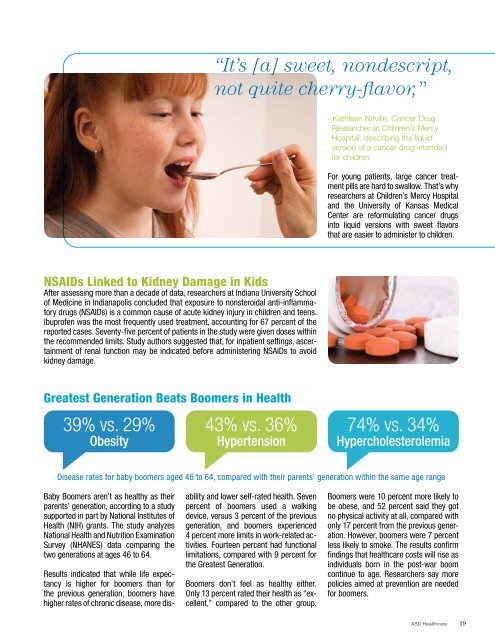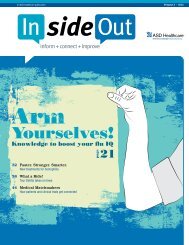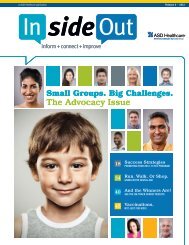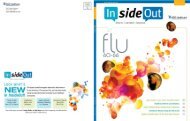media - ASD Healthcare
media - ASD Healthcare
media - ASD Healthcare
You also want an ePaper? Increase the reach of your titles
YUMPU automatically turns print PDFs into web optimized ePapers that Google loves.
“It’s [a] sweet, nondescript,not quite cherry-flavor,”– Kathleen Neville, Cancer DrugResearcher at Children’s MercyHospital, describing the liquidversion of a cancer drug intendedfor childrenFor young patients, large cancer treatmentpills are hard to swallow. That’s whyresearchers at Children’s Mercy Hospitaland the University of Kansas MedicalCenter are reformulating cancer drugsinto liquid versions with sweet flavorsthat are easier to administer to children.NSAIDs Linked to Kidney Damage in KidsAfter assessing more than a decade of data, researchers at Indiana University Schoolof Medicine in Indianapolis concluded that exposure to nonsteroidal anti-inflammatorydrugs (NSAIDs) is a common cause of acute kidney injury in children and teens.Ibuprofen was the most frequently used treatment, accounting for 67 percent of thereported cases. Seventy-five percent of patients in the study were given doses withinthe recommended limits. Study authors suggested that, for inpatient settings, ascertainmentof renal function may be indicated before administering NSAIDs to avoidkidney damage.Greatest Generation Beats Boomers in Health39% vs. 29%Obesity43% vs. 36%Hypertension74% vs. 34%HypercholesterolemiaDisease rates for baby boomers aged 46 to 64, compared with their parents’ generation within the same age rangeBaby Boomers aren’t as healthy as theirparents’ generation, according to a studysupported in part by National Institutes ofHealth (NIH) grants. The study analyzesNational Health and Nutrition ExaminationSurvey (NHANES) data comparing thetwo generations at ages 46 to 64.Results indicated that while life expectancyis higher for boomers than forthe previous generation, boomers havehigher rates of chronic disease, more disabilityand lower self-rated health. Sevenpercent of boomers used a walkingdevice, versus 3 percent of the previousgeneration, and boomers experienced4 percent more limits in work-related activities.Fourteen percent had functionallimitations, compared with 9 percent forthe Greatest Generation.Boomers don’t feel as healthy either.Only 13 percent rated their health as “excellent,”compared to the other group.Boomers were 10 percent more likely tobe obese, and 52 percent said they gotno physical activity at all, compared withonly 17 percent from the previous generation.However, boomers were 7 percentless likely to smoke. The results confirmfindings that healthcare costs will rise asindividuals born in the post-war boomcontinue to age. Researchers say morepolicies aimed at prevention are neededfor boomers.<strong>ASD</strong> <strong>Healthcare</strong> 19






